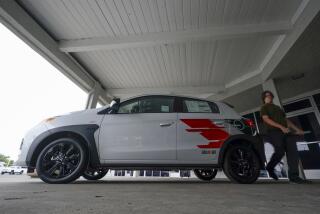Buy late, they still run great
- Share via
Once, it was the point when we summoned a priest -- or at least a mechanic -- to give the car its last rites: 100,000 miles on the odometer meant that, with rare exceptions, your vehicle had just gone from being a vital form of transportation to a planter.
Dust to dust. Rust to rust.
That’s changed. Make no mistake, 100,000 is still a lot of miles, but modern vehicles, with careful driving and proper care, can hit six digits, and then some. Good maintenance is often more important than the car’s brand.
“If you care for them properly, most will give you years of good service,” says Steve Mitchell, owner of Mitchell’s Automotive in Orlando, Fla.
“I have a customer in here right now with 225,000 miles on his Jeep,” Mitchell says, but he stresses that scheduled maintenance and top-quality synthetic oil has kept it running well past retirement age.
Buying a car with high mileage is also a way to get into a nicer vehicle than you might be able to otherwise. According to Edmunds.com, an online pricing resource, a 1995 Lexus LS 400 with 125,000 miles should sell for $7,948 in a private-party transaction. Edmunds prices that same car, with 50,000 miles, at $9,612.
Before you consider a high-mileage vehicle, the more you know about the vehicle’s history, the better. Obtaining a CarFax.com report is a start. CarFax traces a vehicle’s identification number to see how many owners it has had, whether it has been involved in crashes or floods or other incidents. It’s just a start, though; CarFax can’t learn everything and has no idea whether the oil has been changed regularly. That’s why obtaining service records is important. I recently bought a used car from an individual whose records were so complete that he wrote down when he added windshield wiper fluid. Adherence to a routine of regular oil changes and regularly scheduled service -- the vehicle’s owner’s manual will give you the suggested details -- is critically important.
In general, highway miles are better than city miles; fewer stops and starts, for one thing. And nothing against teenagers, but few people consider a vehicle’s history that includes teen drivers to be an asset.
That said, what are a few of the better bets in high-mileage models? Larry Perry, owner of the Magic Mechanic shop in Orlando, radio host and co-author of the automotive question-and-answer column in the Orlando Sentinel, has some favorites.
He likes the 1992 and newer Mercury Marquis, Ford Crown Victoria and Lincoln Town Car models -- similar cars under the skin -- with the modular 4.6-liter V-8 engine. Not only are those cars typically reliable, but they also are usually owned by older drivers, who may be more conservative in driving habits and more proactive in maintenance. Perry also likes the 1997 and up Ford F-150 pickup, and its derivative SUVs, the Ford Expedition and Lincoln Navigator, with the aforementioned 4.6-liter V-8 and that engine’s bigger brother, the 5.4-liter. For something sportier, he also likes Ford Mustang GTs with that 4.6-liter engine.
Perry also likes the 1995 and up Nissan Altimas -- “good cars, but they do have occasional distributor problems” -- plus the 1995 and up Nissan Maximas. He is also a Toyota/Lexus fan and likes the 1992 and newer Lexus GS 300, LS 400 and SC 400, and the 1998 and up LX 470. Toyota trucks and SUVs are durable in all years, he says, citing the Toyota Tacoma, Tundra, Sequoia, 4Runner and Land Cruiser.
Ask Mitchell, and two cars come immediately to mind: the Toyota Camry and Honda Accord. “They’re so hard to beat. Take care of them, and they run forever.” Resale value is also especially strong for the pair, he says: “A Camry or Accord that runs well and has a working air conditioner is worth $2,000 no matter how old they get.”
Mitchell also likes the Nissan Maxima and Altima, as well as General Motors pickup trucks. He’s a fan of Buicks, especially the models with the 3.8-liter V-6 engines. “If you want a domestic car, a Buick LeSabre with that 3800 engine in it will give you great service for years.”
Of course, you don’t get a guarantee of reliability. One reason people buy new cars is the expectation that they’ll start every time and have a warranty to cover any problems that arise. You won’t have that, but it’s a tradeoff for low, or nonexistent, monthly payments.






